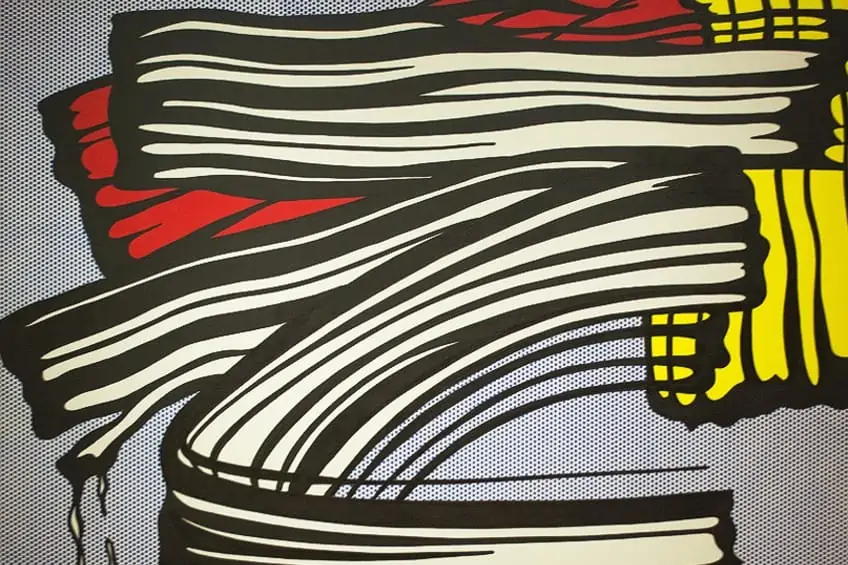Silkscreen Artists and Paintings – A Look at Famous Screen Prints
Whereas nowadays, people have many quick and easy options when it comes to printing artwork, up to a few decades ago, it was not always something that could be accomplished at home, and people relied on more traditional methods such as screen print paintings, otherwise known as silkscreen art. Although it was an arduous task, certain silkscreening artists saw the unique aesthetic of screen-printed artwork as something that they could embrace. Thanks to these screen printing artists, today, we have many beautiful screen printing examples to appreciate. This article will be exploring the most well-known silkscreen artists and paintings that brought them renown.
Famous Silkscreen Artists and Paintings
During the Song Dynasty in China, the first recognized type of screen printing art emerged more than 1,000 years ago. Initially based on hand-stenciling, the technology quickly developed into the use of fine mesh extended across a frame. Because the mesh was occasionally composed of silk, the process was also known as “silkscreen art printing”.
The process of creating screen-printed artwork has remained virtually unchanged since its inception.
Once the screen has been exposed with the appropriate design, silkscreening artists imprint their silkscreen artworks by pressing ink through the screen with a spatula onto diverse materials such as paper, cloth, and even wood. One color is produced at a time, comparable to Japanese woodblock prints, hence a multicolored image requires the utilization of numerous screens. Now let’s take a closer look at a few renowned screen printing artists and their famous screen prints.
Corita Kent (1918 – 1986)
| Nationality | American |
| Date of Birth | 20 November 1918 |
| Date of Death | 18 September 1986 |
| Place of Birth | Fort Dodge, United States |
Corita Kent was a silkscreening artist, teacher, and social justice activist. Her artwork changed throughout her career, from representational and religious iconography to combining commercial imagery and phrases, famous song lyrics, literature, and biblical passages. Her art became progressively more political throughout the 1960s, challenging audiences to address racism, poverty, and social injustice.
The Juiciest Tomato of All (1964)
| Artist | Corita Kent (1918 – 1986) |
| Date Completed | 1964 |
| Medium | Screen printing artwork |
| Current Location | Corita Art Center, Immaculate Heart Community, Los Angeles |
The artwork’s statement is an easily understood and identifiable reference taken from an advert. The observer is pulled into the composition, and once there, they come upon the “footnote”, the tiny, text that can be found inside the letters.
“Mary Mother is the Juiciest Tomato of All”, it says in the microscopic text.
David Weidman (1921 – 2014)
| Nationality | American |
| Date of Birth | 28 June 1921 |
| Date of Death | 6 August 2014 |
| Place of Birth | Belvedere Gardens, United States |
David Weidman may be unfamiliar to many, but his work is well-known. He started his career at animation studios, where he was a part of the development of numerous animated masterpieces. Later, on legendary La Cienega Boulevard, he created a gallery showcasing his great ability to create incredible screen-printing paintings.
Dummy Cat (1965)
| Artist | David Weidman (1921 – 2014) |
| Date Completed | 1965 |
| Medium | Screen printing artwork |
| Current Location | Multiple prints |
This silkscreen artwork was produced in violet in 1965. With a yellow backdrop, it depicts a purple cat with several orange-colored birds resting on the cat’s back and head. The quirky nature of Weidman’s is extremely lighthearted, adding to the fun of the work.
It has brilliantly saturated colors and an arrangement.
Roy Lichtenstein (1923 – 1997)
| Nationality | American |
| Date of Birth | 27 October 1923 |
| Date of Death | 29 September 1997 |
| Place of Birth | Manhattan, New York |
Roy Lichtenstein was a productive printer throughout his lifetime, and his famous screen prints were instrumental in establishing printing as an important art genre in the 1960s. Motivated by comic strips, Roy Lichtenstein created screen-printed artworks with strong contours, vivid colors, and Ben-Day dots. Ranging from “damsels in distress” to architectural and abstracted forms, his topics varied greatly.
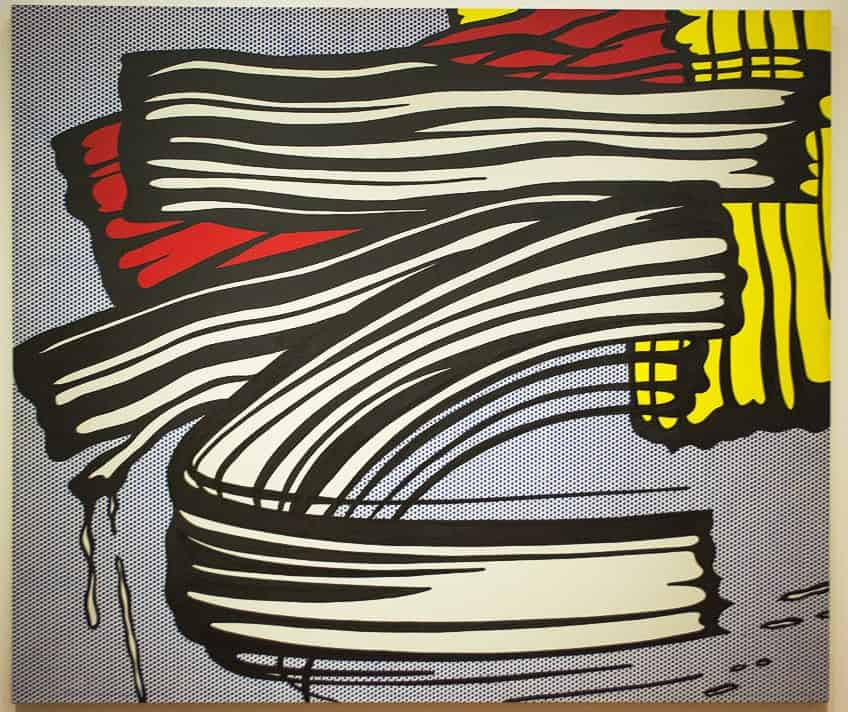 Little Big Painting (1965) by Roy Lichtenstein, located in the Whitney Museum of American Art in New York City, United States; Tim Evanson from Cleveland Heights, Ohio, USA, CC BY-SA 2.0, via Wikimedia Commons
Little Big Painting (1965) by Roy Lichtenstein, located in the Whitney Museum of American Art in New York City, United States; Tim Evanson from Cleveland Heights, Ohio, USA, CC BY-SA 2.0, via Wikimedia Commons
Whaam! (1963)
| Artist | Roy Lichtenstein (1923 – 1997) |
| Date Completed | 1963 |
| Medium | Silkscreen artwork, oil, and acrylic |
| Current Location | Tate Modern Museu, London |
Roy Lichtenstein drew inspiration for the artwork from many comic-book panels. He altered the connection of the visual and narrative aspects of his source, a panel from a 1962 military comic book, by displaying it as a diptych.
It is admired for its two panels’ chronological, spatial, and psychological coherence.
Andy Warhol (1928 – 1987)
| Nationality | American |
| Date of Birth | 6 August 1928 |
| Date of Death | 22 February 1987 |
| Place of Birth | Pittsburgh, Pennsylvania |
Andy Warhol, possibly one of the most famous screen printing artists in the history of art, popularized the process in the 1960s. Andy Warhol is well-known for creating almost photographic image copies of superstar images and converting them into screen-printing artworks by printing them in a range of vivid colors repeatedly. He was close friends with some of the stars he depicted in his famous screen prints, such as Marilyn Monroe.
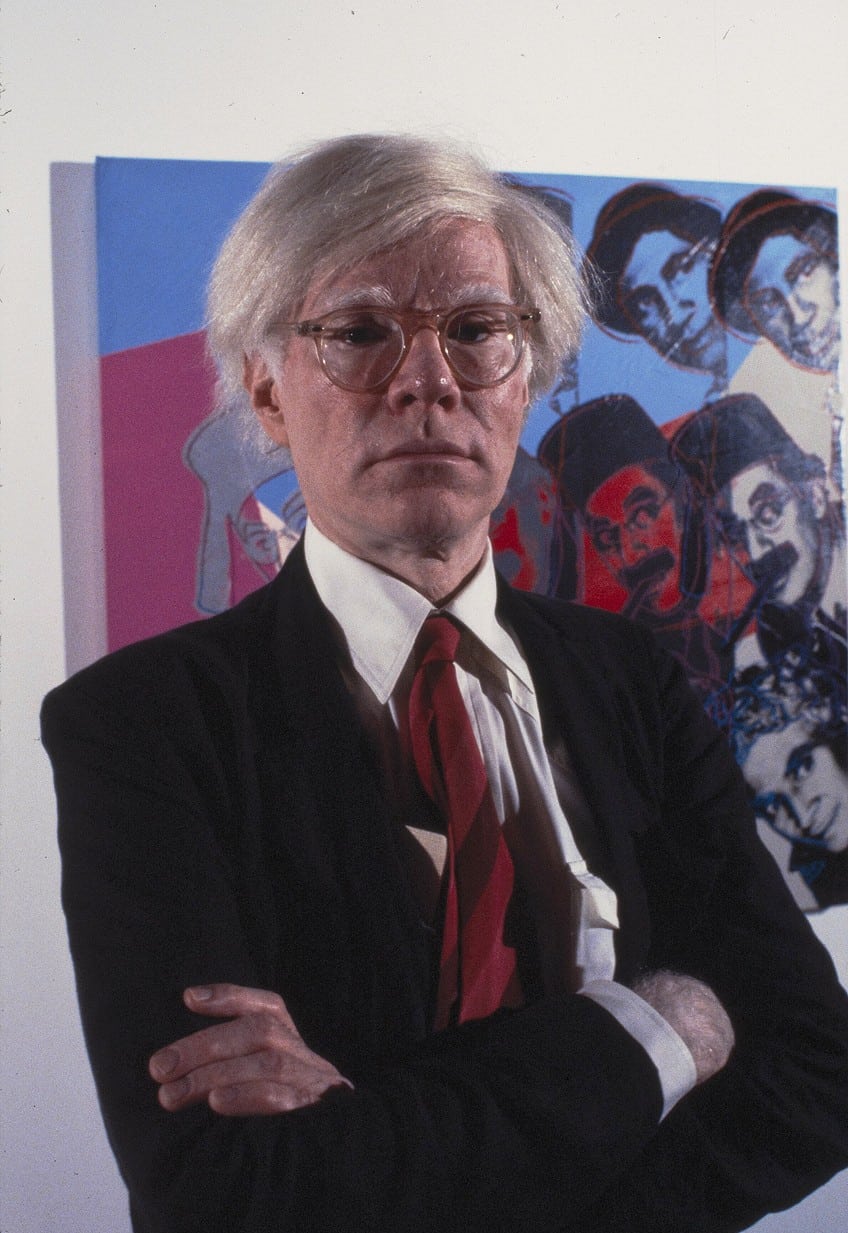 Photograph of Andy Warhol at the Jewish Museum in 1980; Bernard Gotfryd, No restrictions, via Wikimedia Commons
Photograph of Andy Warhol at the Jewish Museum in 1980; Bernard Gotfryd, No restrictions, via Wikimedia Commons
Marilyn Diptych (1962)
| Artist | Andy Warhol (1928 – 1987) |
| Date Completed | 1962 |
| Medium | Screen printed artwork |
| Current Location | Tate Modern Museum of Art, London |
One of Warhol’s most well-known and first screen print paintings was his series of Marilyn Monroe prints, which he had based on a shot from the actress’s film, Niagra (1963). The artist’s urge to make countless duplicates of the same picture began here—whether the subject was a superstar or a commonplace object, Warhol represented whatever he produced as a cultural icon.
“Isn’t life a collection of pictures that evolve as they replicate themselves?” Warhol famously asked.
Richard Anuszkiewicz (1930 – 2020)
| Nationality | American |
| Date of Birth | 23 May 1930 |
| Date of Death | 19 May 2020 |
| Place of Birth | Erie, Pennsylvania, United States |
Anuszkiewicz was interested in the visual alterations that occur when various high colors are put into geometric arrangements with the same geometric configurations. The majority of his work consists of visual examinations of formal structure and color effects, many of which are nested square shapes reminiscent of his instructor Josef Albers’ work. Albers explored color juxtapositions in his work, while Anuszkiewicz expanded on these ideas. Throughout his career, Anuszkiewicz continued to create pieces in the Op Art style.
“III” (1972)
| Artist | Richard Anuszkiewicz (1930 – 2020) |
| Date Completed | 1972 |
| Medium | Silkscreen |
| Current Location | Multiple Prints |
Richard Anuszkiewicz creates paintings whose brilliant colors and geometric patterns seem to jump and pulse off the canvas, combining a fascination with the nature of experience with explorations into the aesthetic and mental significance of color. Anuszkiewicz is a renowned developer of geometric abstraction art.
In his flat, colorful abstractions, he investigates color and shape, seeking to demonstrate the elasticity of our senses of serenity and depth, movement, and color.
Bridget Riley (1931 – Present)
| Nationality | English |
| Date of Birth | 24 April 1931 |
| Date of Death | N/A |
| Place of Birth | West Norwood, London, United Kingdom |
Riley’s creative work is founded on a social utopia. She sees her work as an intrinsically social activity since the spectator completes the painting’s narrative. Because she believed in interactive art, she resisted the commercialization and, in her opinion, the materialist vulgarization of art by the fashion sector.
Leap (2008)
| Artist | Bridget Riley (1931 – Present) |
| Date Completed | 2008 |
| Medium | Screen print |
| Current Location | Joanna Bryant and Julian Page, London |
Bridget Riley’s elaborate, sophisticated geometric abstractions aided in the establishment in the 1960s of the Op Art movement. The British painter arranged colored patterns across her paintings in such a way that they appeared to move or vibrate, giving Op Art its name.
Riley did several black-and-white paintings early in her career, but she is most recognized for her colorful compositions.
Peter Blake (1932 – Present)
| Nationality | English |
| Date of Birth | 25 June 1932 |
| Date of Death | N/A |
| Place of Birth | Dartford, United Kingdom |
Peter Blake, widely considered the father of the Young British Artists movement, makes collages, paintings, and prints that combine modernism with nostalgia. Though he is most known for creating the Beatles’ cover art, he believes painting to be vital to his career. While celebrity personalities inspire his work, folk art, carnival signage, and general nostalgia also have an impact on his silkscreen artworks.
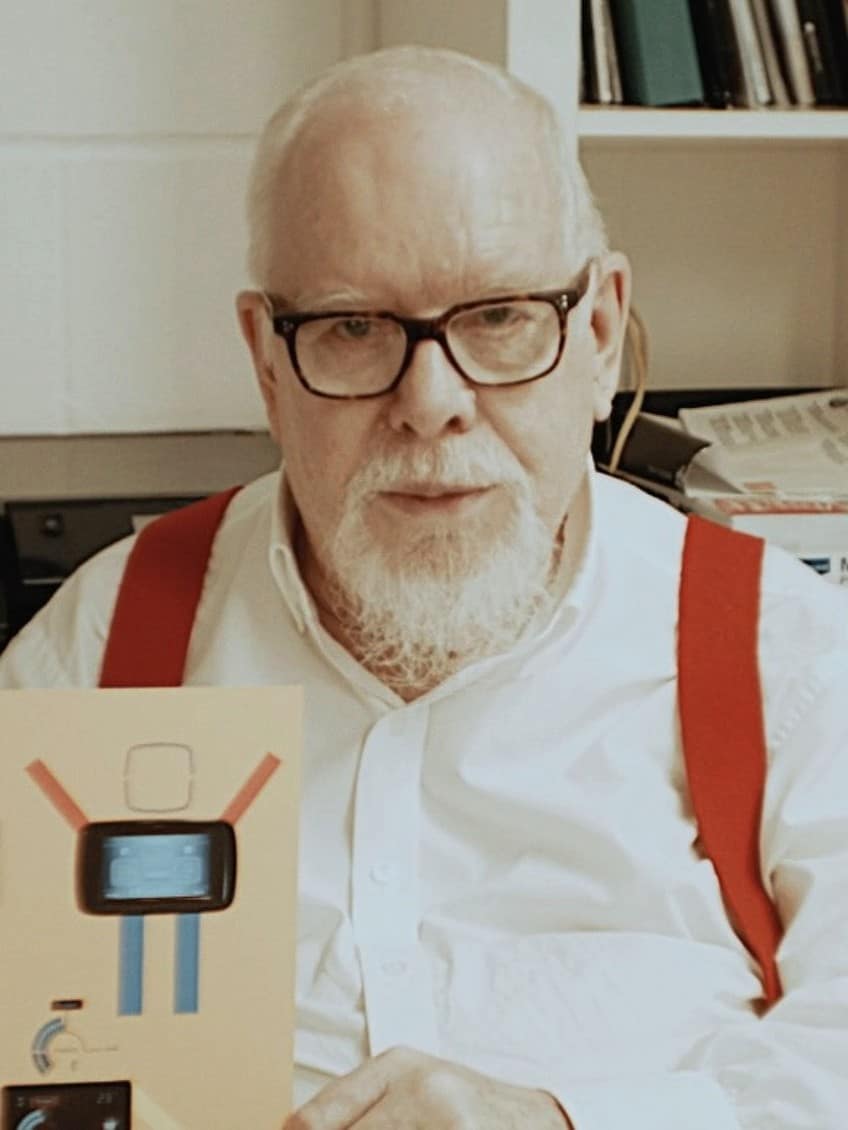
Sergeant Pepper’s Lonely Hearts Club Band (1967)
| Artist | Peter Blake (1932 – Present) |
| Date Completed | 1967 |
| Medium | Silkscreen artwork |
| Current Location | Album cover, multiple prints |
The Beatles’ 1967 masterwork album, an iconic symbol of British pop culture, featured one of the world’s most recognizable screen printing examples on its front cover. It is a silkscreen artwork that has found its way into many households throughout the years.
Many hours can be spent trying to work out who all the various people are on the cover.
Itzchak Tarkay (1935 – 2012)
| Nationality | Israeli |
| Date of Birth | 1935 |
| Date of Death | 3 June 2012 |
| Place of Birth | Subotica, Serbia |
Itzchak Tarkay is regarded as a pivotal pioneer in the contemporary figurative movement. The Israeli artist’s paintings are immediately identifiable studies of people and locations in an ageless world, caught in pictures by parlors, female socialites, terraces, and peaceful cafés. His work has been shown in over 50 exhibits throughout the world.
Rendezvous (2008)
| Artist | Itzchak Tarkay (1935 – 2012) |
| Date Completed | 2008 |
| Medium | Silkscreen artwork |
| Current Location | Multiple prints |
As with many of the artist’s works, this one focuses on two individuals meeting for lunch or tea. One figure is dressed like a socialite, while the other is dressed casually. It is up to the viewer to try and figure out what the rendezvous might be for.
There are no indications as to why the two might be meeting up.
Chuck Sperry (1962 – Present)
| Nationality | American |
| Date of Birth | 5 February 1962 |
| Date of Death | N/A |
| Place of Birth | Dayton, Ohio, United States |
Chuck Sperry resides in San Francisco and has been creating his style of rock poster illustrations for over 20 years. Sperry’s guidance has influenced a new generation of poster and silkscreening artists throughout the world by offering workshops and seminars all around the world. Sperry elevates the trade to high art by creating socio-political artwork that goes beyond rock and roll.
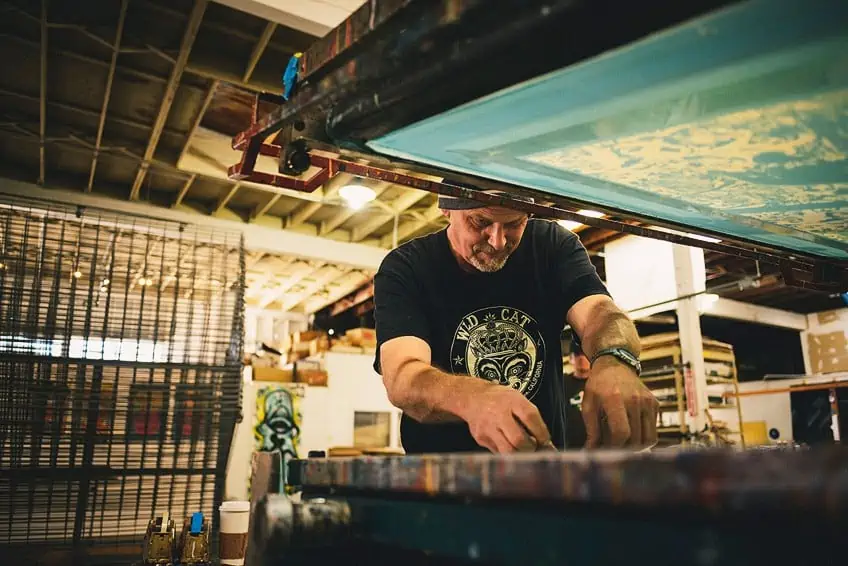
Morgana (2016)
| Artist | Chuck Sperry (1962 – Present) |
| Date Completed | 2016 |
| Medium | Silkscreen artwork |
| Current Location | Private collection |
This artwork features the portrait of a woman. Overlaid on top of her image is a floral pattern similar to wallpaper designs. This flows into the flowers in her hair. The print has been produced in rich greens, oranges, blues, and purples.
Shepard Fairey (1970 – Present)
| Nationality | American |
| Date of Birth | 15 February 1970 |
| Date of Death | N/A |
| Place of Birth | Charleston, South Carolina, United States |
Shepard Fairey rose to popularity in the early 1990s as a significant protagonist in the modern street art movement. Fairey’s renowned 2008 Hope poster campaign for ex-President Barack Obama embodies several reoccurring issues for the silkscreening artist, namely portraiture, propaganda, and political power. Many museums have collections of Fairey’s artworks, that have sold for six figures at auction.
Hope (2008)
| Artist | Shepard Fairey (1970 – Present) |
| Date Completed | 2008 |
| Medium | Silkscreen artwork |
| Current Location | Multiple prints |
Fairey produced the design in a single day and originally printed it as a street board poster. It was subsequently extensively circulated during the 2008 election season, both as a digital picture and other material, with the Obama campaign’s agreement. The picture became one of the most well-known icons of Obama’s campaign, inspiring several versions and replicas, some of which were purchased by the Obama campaign.
That concludes our exploration of silkscreen artists and paintings. Silkscreen is just another term for screen printing art, a printmaking method in which an ink-blocking overlay is placed on a screen, enabling ink smeared on the screen to flow through to a printing surface selectively. By using this method, many famous screen printing artists have emerged through the decades.
Frequently Asked Questions
What Are Screen Print Paintings?
Screenprinting is the technique of forcing ink through a fine screen onto a canvas surface. Rendering some areas of the screen impermeable to printing ink causes the production of a stencil, which inhibits printing ink from flowing through the screens. The printed picture is formed by the ink that flows through.
Do Artists Still Make Screen Printing Art?
Yes, there are many modern screen printing artists. Although in the present age printing art is easy to do, silkscreening artists view this method as part of the art. It has a unique aesthetic that appeals to many people.
Jordan Anthony is a Cape Town-based film photographer, curator, and arts writer. She holds a Bachelor of Art in Fine Arts from the University of the Witwatersrand, Johannesburg, where she explored themes like healing, identity, dreams, and intuitive creation in her Contemporary art practice. Jordan has collaborated with various local art institutions, including the KZNSA Gallery in Durban, the Turbine Art Fair, and the Wits Art Museum. Her photography focuses on abstract color manipulations, portraiture, candid shots, and urban landscapes. She’s intrigued by philosophy, memory, and esotericism, drawing inspiration from Surrealism, Fluxus, and ancient civilizations, as well as childhood influences and found objects. Jordan is working for artfilemagazine since 2022 and writes blog posts about art history and photography.
Learn more about Jordan Anthony and about us.
Cite this Article
Jordan, Anthony, “Silkscreen Artists and Paintings – A Look at Famous Screen Prints.” artfilemagazine – Your Online Art Source. December 21, 2022. URL: https://artfilemagazine.com/silkscreen-artists-and-paintings/
Anthony, J. (2022, 21 December). Silkscreen Artists and Paintings – A Look at Famous Screen Prints. artfilemagazine – Your Online Art Source. https://artfilemagazine.com/silkscreen-artists-and-paintings/
Anthony, Jordan. “Silkscreen Artists and Paintings – A Look at Famous Screen Prints.” artfilemagazine – Your Online Art Source, December 21, 2022. https://artfilemagazine.com/silkscreen-artists-and-paintings/.


